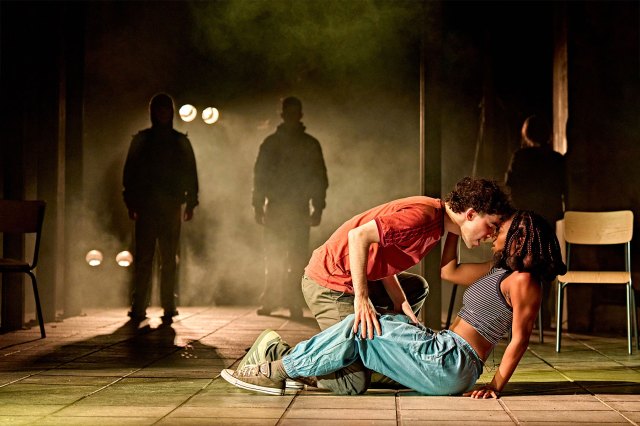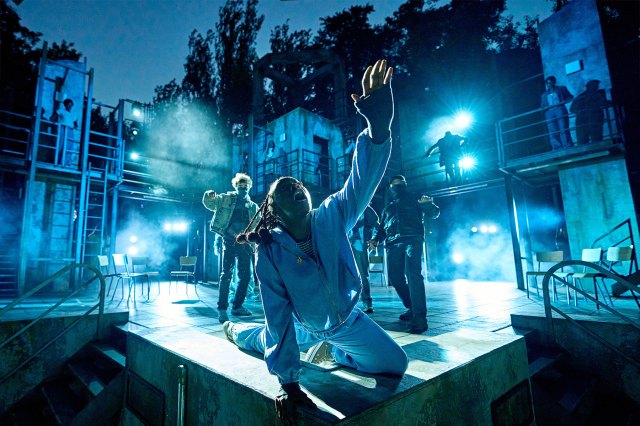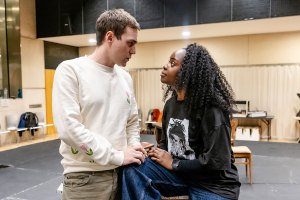Noughts and Crosses at Regent’s Park Open Air Theatre – review
Dominic Cooke’s stage adaptation of the Malorie Blackman novel runs until 26 July

Malorie Blackman’s 2001 novel Noughts and Crosses is a classic amongst young adult fiction, the first in a series, and it’s a sad reflection that, as time goes by, it only feels more and more relevant. Dominic Cooke’s dramatisation, originally seen at the RSC in 2007, is a real hard hitter, imagining an alternative universe where Black people (the Crosses) have all the wealth, privilege and power, brutally discriminating against the poverty-stricken whites (the Noughts).
Plotwise, there’s a superficial similarity to Romeo and Juliet with politician’s daughter Sephy (short for Persephone), a Cross (Corinna Brown), falling for intellectually gifted but penurious Nought Callum (Noah Valentine) as he joins her elite school on a scholarship. Blackman and Cooke are more interested in the edgy dynamics between the haves and the have-nots though, envisioning a milieu where division, state-sanctioned intimidation and capital punishment are the norm, and the underclass are fomenting violent rebellion.
Tinuke Craig’s tense, grungily handsome production is a surprising choice for Regents Park – Colin Richmond’s towering, brutalist set, all platforms, grotty tiles and rusting staircases, sits in stark contrast to the loveliness of the sylvan greenery – but wields considerable power. Commendably unwilling to pull punches as it examines how ordinary people can be drafted into terrorism, depicting an all-too-recognisable world where danger and inequality are constants. It’s seldom subtle but consistently effective, although visual differentiations between rich and poor could be more pronounced.
A 2019 tour co-produced by Stratford East and a quintet of regional theatres used a different stage treatment (by Sabrina Mahfouz) that streamlined the novel, excising plot points and characters. By comparison, Cooke’s adaptation feels a little over-stuffed, especially in the second half. However, it also seems more politically charged and disturbing, although that may simply be a response to the way that the so-called civilised world has devolved during the intervening years.

Noughts and Crosses highlights the micro-aggressions and outright prejudice that Black people have been subjected to for generations, but here flipped so that the Caucasian Noughts “who smell funny and eat weird food” are on the receiving end. The writing and Craig’s staging are stronger on grit and conflict than on softer aspects of the story.
It’s certainly roaringly theatrical: a large cast is in almost constant view, like a silent Greek chorus, observing and judging, with individuals breaking out to play school kids, revolutionaries, domestic staff, victims of a shopping centre bombing… Brown and Valentine are a compelling central pairing, and watching them progressively disengage as they stumble into unhappy maturity is genuinely affecting.
Chanel Waddock is heartbreaking as Callum’s sister, damaged forever by a racially provoked attack, and Alec Boaden makes something singular and terrifying out of the brother hell bent on vengeance. Richard Riddell and Kate Kordel find a raw anguish in these fractured siblings’ parents that borders on the elemental.
On the other side of the social divide, Amanda Bright brings a dry, elegant sorrow to Jasmine, Sephy’s Chablis-soaked mum, and Jessica Layde does sterling, understated work as a permanently exasperated but not unkind older sister. Some of the supporting performances tend to be a little overstated, but this does not apply to Helena Pipe’s measured lawyer and Emma-Jane Goodwin’s winningly warm go-between for the ill-starred lovers.
DJ Walde’s music, Max Pappenheim’s sound design, and the inventive movement direction of Ingrid Mackinnon contribute valuably to the all-pervading sense of unease. The storytelling is a little baggy after the interval, but the destructive, dehumanising effects of mindless prejudice and grinding poverty – plus the sense that people can only be pushed so far before imploding – is keenly felt. As family-friendly shows go, this is no easy watch, but it’s thought-provoking and ambitious. The teenagers sitting near me were spellbound, and out of their seats, roaring with approval after the bleak conclusion.



















